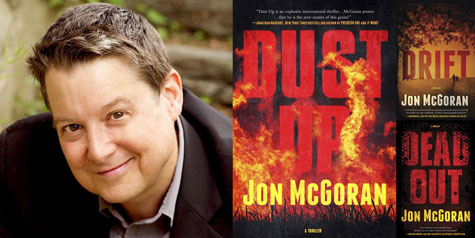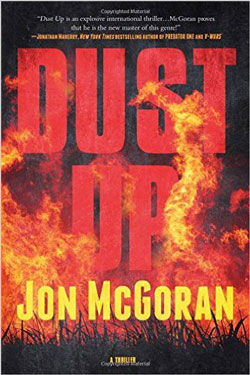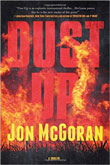
This original blog post by author Jon McGoran is part 1 of a 2 part series including an exclusive Q&A featuring questions from YOU, the readers. To win a copy of Jon's new book Dust Up, make sure you're signed in, and ask the author a question in the comments section below. We'll choose the best questions to be included in the forthcoming Q&A, and those users will also win a copy of Dust Up!
Dust Up, the third book in my Doyle Carrick series of ecological thrillers, is set to launch on April 19, and I'm a little bit trepidatious about what parts of it are about to come true.
One of the things I particularly enjoy in writing the series is exploring topics that are current and controversial, and doing it in the form of what is hopefully a kickass thriller. It’s a dangerous game. You want each book to be both timely and timeless, but just as nothing feels more current than a topic ripped from the headlines, few things make a book seem more like yesterday’s news than being about, well, yesterday’s news.
It’s bad enough when your protagonist’s favorite real-life watering hole burns down or gets bulldozed for condos. But, if a central idea of your novel is rendered irrelevant or inappropriate, it could sting a whole lot more.
My Doyle Carrick books are set against the growing role of the biotech industry and how biotech companies increasingly control our food supply and more. When I started writing about this, it wasn’t ripped from the headlines, or even from the back pages, because it wasn’t in the news at all. That is part of what I found so fascinating about the whole “Genetically Modified Food” story—there was a historic shift in the technology and control of our food, and apart from a few bloggers and concerned scientists, no one was talking about it.
It took a few years to write and publish Drift, and by the time it came out, its themes had become part of a national conversation.
In Deadout, I expanded on some of the same topics, in addition to the not-unrelated issue of Colony Collapse Disorder, which was causing honeybees to die off around the world. Once again, I saw a huge and fascinating topic of which most people were aware of. By the time the book came out, honeybees were generating a lot of buzz (sorry).
Luckily, in neither case were the topics rendered old news. But, it was remarkable and nerve-wracking how much the context of the issues and the coverage and awareness of them had changed while the book made its way from idea to publication. Things move so rapidly these days that in that time span, the science and technology can change dramatically.
In both Drift and Deadout, key ideas, that some called outlandish or even impossible while I was researching them, became reality soon after the books came out.
One story element in Drift involves biopharming—genetically engineering crops to create pharmaceuticals. Wouldn’t it be a hoot, I thought, if a drug cartel manipulated food crops to produce opioids, so they could grow heroin domestically? While some of the scientists I interviewed said the science was feasible and the idea interesting, others said it was far-fetched or even flat-out impossible. A year or so after the book came out, scientists working on a similar project announced they had successfully created opioid-producing yeast.
In Deadout, the second book in the series, a biotech company develops a genetically engineered honeybee that is touted as being resistant to colony collapse. (What could go wrong, right?) Frankly, I was kind of surprised when I started researching the topic to find no mention of anyone attempting this.
There were genetically engineered mosquitoes (which are back in the news as part of the effort to fight Zika) and robotic honeybees. (For real. And those stories came out less than six months after an environmental group released a really well-done satirical video about just that.) But, no one was talking about genetically engineered honeybees. Once again, less than a year after the book came out, stories appeared about biotech companies working on genetically engineered honeybees that would be immune to colony collapse.
 Dust Up takes a more international angle on the biotech revolution, exploring some of the ways governments and corporations can pressure other countries to loosen restrictions on US biotech products. Several aspects of Dust Up have unfortunately already come true.
Dust Up takes a more international angle on the biotech revolution, exploring some of the ways governments and corporations can pressure other countries to loosen restrictions on US biotech products. Several aspects of Dust Up have unfortunately already come true.
The book takes place in Haiti, at a time of drought and serious political chaos. Haiti’s political climate hasn’t been truly stable in decades, if not centuries, due in large part to a long history of injustice, oppression, and wealth extraction imposed on it by richer nations. But, the situation was quiet enough when I began writing Dust Up, that I wondered if I was doing the country a disservice by depicting such turmoil.
I wasn’t able to visit Haiti until I was well into writing the book. By then, the political climate was quickly deteriorating, and it worsened considerably while we were there. Amid accusations of widespread voter fraud, the disparate parties had been unable to schedule elections for several years. As a result, on the day after our departure date—the fifth anniversary of the devastating 2010 earthquake—parliament would effectively dissolve, leaving the increasingly unpopular president as the sole ruler—essentially a dictator.
As we left, the country was embroiled in deadly protests, eerily similar to the ones in Dust Up. A year and a half later, elections have finally been held and parliament reinstated. But, while the president peacefully left office, more controversy over fraud has stalled the election process before a runoff could determine the next president—leaving the country without an executive and enforcing parliament to appoint an interim president.
At the same time, tragically, the drought that was just starting as I began the book is now in its third year.
Dust Up also looks at how these massive corporations can simultaneously collude and compete, with potentially terrible consequences for those caught in the middle. The scheme at the center of the book is scientifically plausible and potentially devastating, but revealing the science behind it would be too much of a spoiler. For now, I’ll have to keep it between myself and those who have read the book, and hope this part doesn’t show up in the news.
Remember to ask the author a question in the comments below for a chance to be featured in the forthcoming Q&A and to win a copy of Dust Up by Jon McGoran.
To enter, make sure you're a registered member of the site and simply ask a question below.
TIP: Since only questions from registered users will be evaluated, if your user name appears in red above your comment—STOP—go log in, then try asking again. If your user name appears in black above your question, You’re In!
 Dust Up Q&A: NO PURCHASE NECESSARY TO ENTER OR WIN. A purchase does not improve your chances of winning. Open to legal residents of 50 United States, D.C., and Canada (excluding Quebec), who are 18 years or older as of the date of entry. To enter, complete the “Post a Comment” entry at www.criminalelement.com/blogs/2016/04/predicting-the-future-jon-mcgorans-doyle-carrick-series-coming-true-dust-up-qa beginning at 2:00 p.m. Eastern Time (ET) April 13, 2016. Ends 1:59 p.m. ET April 27, 2016. Void outside the United States and Canada and where prohibited by law. Please see full details and official rules here. Sponsor: Macmillan, 175 Fifth Ave., New York, NY 10010.
Dust Up Q&A: NO PURCHASE NECESSARY TO ENTER OR WIN. A purchase does not improve your chances of winning. Open to legal residents of 50 United States, D.C., and Canada (excluding Quebec), who are 18 years or older as of the date of entry. To enter, complete the “Post a Comment” entry at www.criminalelement.com/blogs/2016/04/predicting-the-future-jon-mcgorans-doyle-carrick-series-coming-true-dust-up-qa beginning at 2:00 p.m. Eastern Time (ET) April 13, 2016. Ends 1:59 p.m. ET April 27, 2016. Void outside the United States and Canada and where prohibited by law. Please see full details and official rules here. Sponsor: Macmillan, 175 Fifth Ave., New York, NY 10010.
To learn more or order a copy, visit:
opens in a new window![]() opens in a new window
opens in a new window![]() opens in a new window
opens in a new window![]() opens in a new window
opens in a new window![]()
Jon McGoran is the author of six novels, including the ecological thrillers Drift, Deadout and Dust Up, and the D. H. Dublin forensic thrillers Body Trace, Blood Poison, and Freezer Burn. He has been writing about food and sustainability for twenty years, as communication director at Weavers Way Co-op in Philadelphia and editor The Shuttle, and editor in chief at Grid magazine. During that time he has also been an advocate for urban agriculture, cooperative development and labeling of genetically engineered foods. He is a founding member of the Philadelphia Liars Club, a group of published authors dedicated to promotion, networking, and service work. He lives in Philadelphia with his wife and son.

Are there any
controversial topics you won’t write about? Like what?
I look forward to reading your new book. You have an important story written in a way to engage and enlighten your readers.
How the heck do you dare to eat anything? After reading your books I compulsively read labels but since I heard that even my beloved Grape-Nuts may be tainted I trust no one.
Jon, I read somewhere that the island of Kauai is being used a lot by biotech companies as a testing ground for genetically engineered plants – growing season long enough for two or three plantings a year, abundant water, out of the public eye. The resultant contamination of everybody else’s crops mean Kauai has become one big experiment. Would you do a novel on this facet of the biotech industry and what it might mean for communities in harm’s way?
Do you think that you’ll explore Big Pharma and a viral outbreak in a future novel?